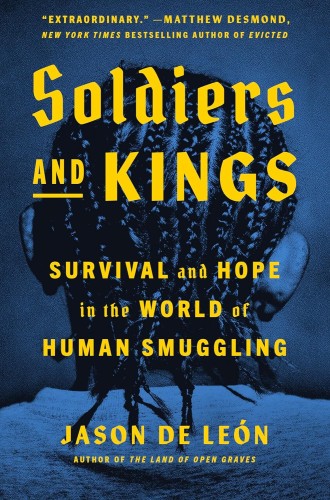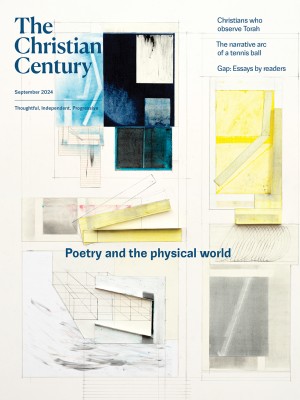The humanity of human smugglers
Anthropologist Jason De León charts the desperation, grief, and friendships of the Central American guías who bring migrants across borders.

Soldiers and Kings
Survival and Hope in the World of Human Smuggling
Not every migrant is a criminal, I think to myself. This is my liberal conceit. My air of moral superiority. It is also my history. My grandparents are Mexican migrant farmers from the border of Texas and Mexico. My father migrated to the United States from the Philippines. When people accuse migrants of being criminals, I feel slighted and take aim with a well-worn defense.
But this conceit hides naïveté, shallow solidarity, a mistaken binary. I forget that appeals to “not every migrant is a criminal” can slight those migrants who, stuck between not wanting to return home and being unable to get to the United States, turn to the illicit work of smuggling to make a living. In an immersive and deeply personal work of ethnography and journalism, anthropologist Jason De León follows the lives and work of the Central American guías, smugglers who guide migrants across the wilderness and through the cities of Mexico to the southern border of the United States. What emerges is a haunting and humane portrait of those surviving amid harsh immigration policies that have exacerbated the precarity of migrant life.
Read our latest issue or browse back issues.
In many ways, Soldiers and Kings can be seen as a sequel to De León’s The Land of Open Graves: Living and Dying on the Migrant Trail, in which he documented how US immigration policies such as prevention through deterrence weaponized the desert landscape of the southwest border to prevent people from migrating to the United States. Soldiers and Kings follows several guides in the aftermath of the Mexican enforcement project called Programa Frontera Sur, which was launched in 2014 to help immigration security forces apprehend and deport Central American migrants at Mexico’s southern border. The program’s deterrent policies, De León shows, force migrants to turn to guides who can find safe and secure routes to the United States.
The migrant trail is both a path to salvation and a world of death.
The guides, many of them young adults, are complicated figures—but not any more complicated than other young adults coming of age in today’s world. They party. They struggle with drug addictions. They have affairs. They listen to hip-hop. They care about fashion. But they also pray. They trust that God will deliver them from the violence they are running from. They fall in love.
What the guides do not have is financial stability. In De León’s portrayal, he pushes back against the idea that these guides are simply profiteers seeking to exploit the vulnerabilities of desperate migrants running for their lives. Reality is more complicated. Many guides are themselves migrants who cannot get into the US and don’t want to return to the violence that awaits them at home. They live day to day, sometimes with a few hundred dollars and other times with nothing at all. Even the “kings” of the migrant trail can be desperate. In a moving chapter, De León tells the story of Kingston, a guide who has made thousands of dollars helping to smuggle people into the US. While Kingston is with De León one evening, thieves break into his apartment and steal everything.
The migrant trail is both the path to salvation and a death world. Soldiers and Kings begins in death, the death of a guide whose name is misprinted in a local Honduran newspaper. The background stories of the guides are riddled with death too. Many of them decided to flee because of gang violence wreaking havoc in their hometowns. They flee from this danger by attempting the journey into Mexico to get to the US. But there they face the death threats of the gangs and cartels who control parts of the trail. Often, the guides mediate such death threats for other migrants by taking them through safer routes or by negotiating with the gangs to let migrants through. Even if they succeed, the migrants still face the death threats of sickness or injury.
Grief over the death world of the migrant trail makes Soldiers and Kings a book about friendship and recognition as much as it is about the work life of migrant guides. Intimate scenes of De León eating alongside the guides, laughing with them, buying them food, learning their stories, and grieving their deaths complicates his relationship with them. De León is not just there as a neutral scientist-observer. He cares about the guides as one cares for a person they love, a love that is reciprocated. When Kingston gets in a bar fight to defend De León, De León is left shocked at where his research is taking him. When De León contemplates the spiritual loneliness of the guides, he sees himself in them. He confesses that he is attracted to such people because of the loneliness he has experienced navigating life in the US from its margins—as a child of divorced parents, as a military kid forced to move to new places and interact with strangers, and as a Filipino Mexican American.
Affinity is at the heart of Soldiers and Kings. The stories of the guides made me cry at their immense suffering, laugh at their playful jokes, rage at the injustice they face, and feel inspired by their will to survive. “I begin this book with the seemingly radical proposition,” writes De León, “that those who try to make a living guiding people across hardening geopolitical boundaries are themselves human.” It is this commitment—one that should be assumed, and that De León goes to extreme lengths to defend—that makes Soldiers and Kings holy work.






